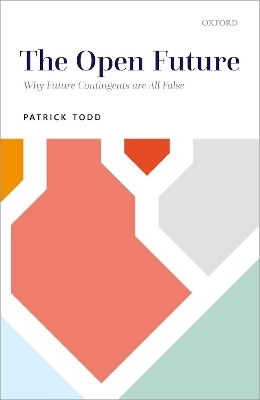
The Open Future
Why Future Contingents are All False
Seiten
2021
Oxford University Press (Verlag)
978-0-19-289791-6 (ISBN)
Oxford University Press (Verlag)
978-0-19-289791-6 (ISBN)
This book launches a sustained defense of a radical interpretation of the doctrine of the open future. Patrick Todd argues that all claims about undetermined aspects of the future are simply false.
In The Open Future: Why Future Contingents are all False, Patrick Todd launches a sustained defense of a radical interpretation of the doctrine of the open future. He argues that all claims about undetermined aspects of the future are simply false. Todd argues that this theory is metaphysically more parsimonius than its rivals, and that objections to its logical and practical coherence are much overblown. Todd shows how proponents of this view can maintain classical logic, and argues that the view has substantial advantages over Ockhamist, supervaluationist, and relativist alternatives. Todd draws inspiration from theories of ''neg-raising'' in linguistics, from debates about omniscience within the philosophy of religion, and defends a crucial comparison between his account of future contingents and certain more familiar theories of counterfactuals. Further, Todd defends his theory of the open future from the charges that it cannot make sense of our practices of betting, makes our credences regarding future contingents unintelligible, and is at odds with proper norms of assertion. In the end, in Todd's classical open future, we have a compelling new solution to the longstanding "problem of future contingents".
In The Open Future: Why Future Contingents are all False, Patrick Todd launches a sustained defense of a radical interpretation of the doctrine of the open future. He argues that all claims about undetermined aspects of the future are simply false. Todd argues that this theory is metaphysically more parsimonius than its rivals, and that objections to its logical and practical coherence are much overblown. Todd shows how proponents of this view can maintain classical logic, and argues that the view has substantial advantages over Ockhamist, supervaluationist, and relativist alternatives. Todd draws inspiration from theories of ''neg-raising'' in linguistics, from debates about omniscience within the philosophy of religion, and defends a crucial comparison between his account of future contingents and certain more familiar theories of counterfactuals. Further, Todd defends his theory of the open future from the charges that it cannot make sense of our practices of betting, makes our credences regarding future contingents unintelligible, and is at odds with proper norms of assertion. In the end, in Todd's classical open future, we have a compelling new solution to the longstanding "problem of future contingents".
Patrick Todd received his PhD in 2011 from the University of California, Riverside. He has written about a range of philosophical issues, including free will and determinism, moral responsibility, time and omniscience, and the open future. In 2013, he took up a permanent position at the University of Edinburgh as a Chancellor's Fellow and Lecturer.
The Open Future: Introduction to a Classical Approach
1: Grounding the Open Future
2: Three Models of the Undetermined Future
3: The Open Future, Classical Style
4: The Will/Would Connection
5: Omniscience and the Future
6: Betting on the Open Future
7: with Brian Rabern: Future Contingents and the Logic of Temporal Omniscience
8: The Assertion Problem
| Erscheinungsdatum | 05.11.2021 |
|---|---|
| Verlagsort | Oxford |
| Sprache | englisch |
| Maße | 160 x 242 mm |
| Gewicht | 464 g |
| Themenwelt | Geisteswissenschaften ► Philosophie ► Logik |
| Geisteswissenschaften ► Philosophie ► Metaphysik / Ontologie | |
| Geisteswissenschaften ► Philosophie ► Sprachphilosophie | |
| ISBN-10 | 0-19-289791-8 / 0192897918 |
| ISBN-13 | 978-0-19-289791-6 / 9780192897916 |
| Zustand | Neuware |
| Informationen gemäß Produktsicherheitsverordnung (GPSR) | |
| Haben Sie eine Frage zum Produkt? |
Mehr entdecken
aus dem Bereich
aus dem Bereich


